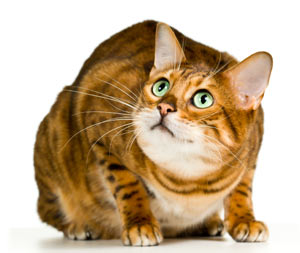Stress in Cats

Stress is something with which most people are familiar. There are many causes of stress in people including money concerns, health problems, and relationship issues. We know that stress can contribute to or cause physical conditions such as headaches and high blood pressure. Cats can experience stress, too, and it can be detrimental to their health.
What Is Stress?
When cats are living in the wild, stress occurs mainly when they are exposed to a predator or other life-threatening situation. The cat's adrenal glands respond to the threat by secreting more hormones that raise the heart rate, increase blood pressure, and produce more blood sugar. These physiologic responses are all designed to prepare the kitty to fight or flee the dangerous situation. In the short term, these changes are essential. However, when there is long-term stress, they are detrimental. Think of it like a car: if you need to rev the engine while passing a semi so you can get back into your lane, it's essential that your car responds. However, if you were to constantly gun the engine, it would result in its breaking down sooner from overuse.
What Causes Stress in Cats?
When you look at your kitty's life, you may not see anything that you feel could be stressful. After all, cats don't have to worry about bills or work deadlines. However, there are lots of common situations that do cause chronic stress in cats. These include:
- Boredom
- Territory anxiety
- Conflicts with other animals in the home
- Loud noises such as thunderstorms, fireworks, gunshots, or music
- Loss of a human or animal in the family
- Changes in routine or schedule
- Being declawed
- Adding a person or pet to the family
- Nutritional problems
- Flea infestations
- Medical conditions
- Moving or traveling
- Parties
- Being left home alone
- Remodeling or furniture rearrangement
- Limits in resources such as food, water, clean litter, and scratching surfaces
- Visits to the veterinarian, kennel, or groomer
- Car rides
While these are some of the more common things that are known to cause stress in many cats, there is no limit to the list of possible anxiety triggers because they are individuals with their own unique concerns.
Prolonged Stress in Cats Can Cause Physical Illness and Negative Behaviors
Chronic stress can contribute to, cause, and/or decrease recovery from many physical ailments, including:
- Urinary tract problems
- Skin conditions
- Allergies
- Cancer
When suffering from stress, cats may also exhibit a variety of behavioral changes. Many become restless, meow, shiver, or hiss. Some may cower in a closet or hide behind furniture. Other stress-related behaviors in cats are destructive in nature. The most common of these are:
- Excessive self-grooming that may result in missing patches of fur and secondary skin infections.
- Chewing on or scratching at furniture, shoes, pillows, walls, doors, or other items.
- Inappropriate urination, defecation, or marking behavior outside of the litter box.
Not only are these behaviors undesirable in terms of damage to homes or items, but it is also heartbreaking to see one's cat suffer.
Treatment of Stress in Cats
There are some things that you can do for your cat if you suspect that some new behavior she is exhibiting might be due to stress. If you think you know what the trigger is, try to decrease its impact as much as possible. For instance, if you are bringing a new cat into your home, there are some ways to make the transition smoother. If it is the Fourth of July and fireworks are stressful to your cat, you can create a safe room or space to help her remain calm.
Whenever your cat is exhibiting abnormal signs or behaviors, consult with your veterinarian to ensure there is no underlying physical disease. Be sure to have any treatments you choose for your cat approved by your vet first.
In addition to addressing the primary cause of your cat's stress or in situations where you aren't sure of its cause, you can use the following general techniques to help your feline friend:
- Remain calm yourself, and speak with a soothing voice to your stressed kitty at all times to help her feel less anxious. Cats are super-sensitive and finely-tuned to your emotions and your tone of voice.
- Massage and slowly pet your cat in a quiet room. It is a wonderful de-stressor for your cat and also helps ease your own tension. You can create a time in which the cares of the day may be put aside, and only quiet and relaxing thoughts are experienced.
- Play with your cat using interactive toys. Exercise is a wonderful de-stressor for cats and humans.
- For a homeopathic treatment, try Bach Flower Rescue Remedy. It is an all-natural combination of five powerful flower essences believed to help calm and de-stress cats.
- Pheromones are signal-carrying hormones that are released by the body in order to promote a specific response by another member of the same species. In cats, one of these is the feline facial pheromone. When cats rub their faces on objects (or humans), they are releasing this substance. Feliway is a product that mimics this feline facial pheromone. It can be sprayed or diffused in the home to promote feelings of calmness in your cat. You can learn more about Feliway and how it works in this article: "Feliway - A Useful Tool to Help Treat Stress in Cats."
- Music soothes agitated beings. Try playing light classical pieces as you interact with your cat using these other methods. It will add to the calming atmosphere for you both.
- Some cats may require anti-anxiety medication to decrease stress levels. This is best done on a temporary basis in conjunction with some of the other modifications discussed here. You can talk with your veterinarian to determine if it's the right choice for your cat. Never give any medications to your cat without speaking with your veterinarian. Cats are extremely sensitive to many medications, and giving them can cause serious injury or death.
Prevention of Feline Stress
As with many conditions, prevention can be the key to managing stress in cats. You can prevent many chronic stress problems by following the following guidelines.
- Always follow basic good health measures. Provide clean water, good-quality food, and appropriate veterinary care.
- Take time for interactive play. Cats need to meet their innate need to stalk, pounce on, and kill prey. Indoor cats don't have much opportunity to fulfill these needs, and they can develop stress as a result. Interactive play with toys that mimic prey-behavior, such as wand toys that can be made to act like birds and squeaky mouse toys that can be made to dart around the room can fulfill this need. The interactive nature of the play, spending time with you, is also therapeutic for both you and your cat. Play can give your cat exercise to strengthen her immune system, release any pent-up negative energy, and build her confidence.
- Provide appropriate places to scratch, climb, and watch birds. Cats need to scratch. It's good for their muscles, allows them to mark their territory, and releases tension. Providing cat scratching posts and condos that are cat- and human-friendly can help your cat manage stress.
- Establish and follow a routine. Most cats do better when they know what to expect and when. Following at least a loose schedule can provide consistency and normalcy that combats stress.
-
Avoid tedium. Establishing a schedule doesn't mean that things should be so structured that your cat becomes bored. Some ideas for keeping things interesting include:
- Leaving fun things out to discover sometimes. Don't always keep the same things in the same places. One great idea is to leave the insert to an angled scratching post under your bed, waiting to be discovered and scratched by your cat.
- Bringing home a new cardboard box periodically. Cats love boxes, and discovering a new one every once in a while will be exciting.
- Placing a paper bag with the handles removed in new spots around the home. You can find other easy do-it-yourself cat toy projects in the article "Clever DIY Cat Toys."
- Maintain a calm household. Cats pick up on and internalize the emotional states of their closest humans, whether they're positive or negative. The more calm and peaceful the general atmosphere of your home is, the less stress your cat will have.
Be Proactive About Managing Cat-Stressful Situations
Whenever a stressful event or situation is approaching, be sure to stick to your established routine as much as possible, remember not to skip the interactive play sessions with your cat, and give her a little extra attention and reassurance. Project a positive attitude about the change or occasion.
Some examples of ways to ease specific stressful situations are noted below:
- If you are bringing a new cat into the home, follow strategies that will help both the new and the resident cat adjust, such as providing a special room for the new cat, so the two aren't thrown together immediately. You can find a step-by-step guide for introducing cats here: "How to Introduce a New Cat to a Household that Already Has a Cat."
- If you are moving to a new home, prepare it for your cat before you take her there. If possible, furnish one room with all of her cat-necessities, so she isn't bombarded with the entire strange, new house all at once. Unpack the scratching posts before she arrives so she can christen the new home in her scent. Use Feliway around the house, at cat-nose level, provide extra play sessions (maybe with some new, exciting toys), and spend time cuddling and hanging out with your cat in her retreat room. If your cat likes catnip, have some play sessions with it in the retreat room.
- If an outside cat is hanging around, causing your cat stress, you may be noticing that your cat is scratching at the door or window frames or even showing displaced aggression to you or other animals in the home. Some ways to deal with this situation include talking to the owner of the outdoor cat if you know who it is or humanely shooing the cat away using motion-detecting water or ultrasonic sound machines
. It's also especially important in this situation to ensure that your cat has plenty of scratching posts because scratching is an important way that cats mark their territory. Place posts in the area where your cat can see the outside cat, such as next to the sliding glass door. Distract your cat from watching the other cat when you can, and you may even try to block her view outside if possible.
- If you have a multiple cat household, provide enough resources. Resources, for cats, include food and water, toys, perches, scratching posts, litter boxes, cat beds, and access to the household's human(s) for love, attention, and play. When you have more than one cat, you need to provide enough of all of these resources to keep them all happy. If a cat feels that resources are scarce, she may become stressed and begin exhibiting undesirable behaviors.
Love Is a Powerful Stress-Reducer

When you take steps to reduce your cat's stress because you love her, she will pick up on this and reciprocate. That will decrease your stress, as well. Love is contagious, and you will both benefit when you give it unconditionally to your cat. Life is stressful for everyone sometimes; be sure to help one another through it.
You May Also Like These Articles:
Why Do Cats Purr? The How & Why of Cat Purring
Feliway - A Useful Tool to Help Treat Stress in Cats
<The Benefits of Having Multiple Cat Scratching Surfaces
Declawing Cats: Banning Declaw Surgeries
Notice: Ask-a-Vet is an affiliated service for those who wish to speak with a veterinary professional about their pet's specific condition. Initially, a bot will ask questions to determine the general nature of your concern. Then, you will be transferred to a human. There is a charge for the service if you choose to connect to a veterinarian. Ask-a-Vet is not manned by the staff or owners of CatHealth.com, and the advice given should not delay or replace a visit to your veterinarian.






